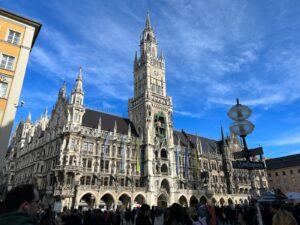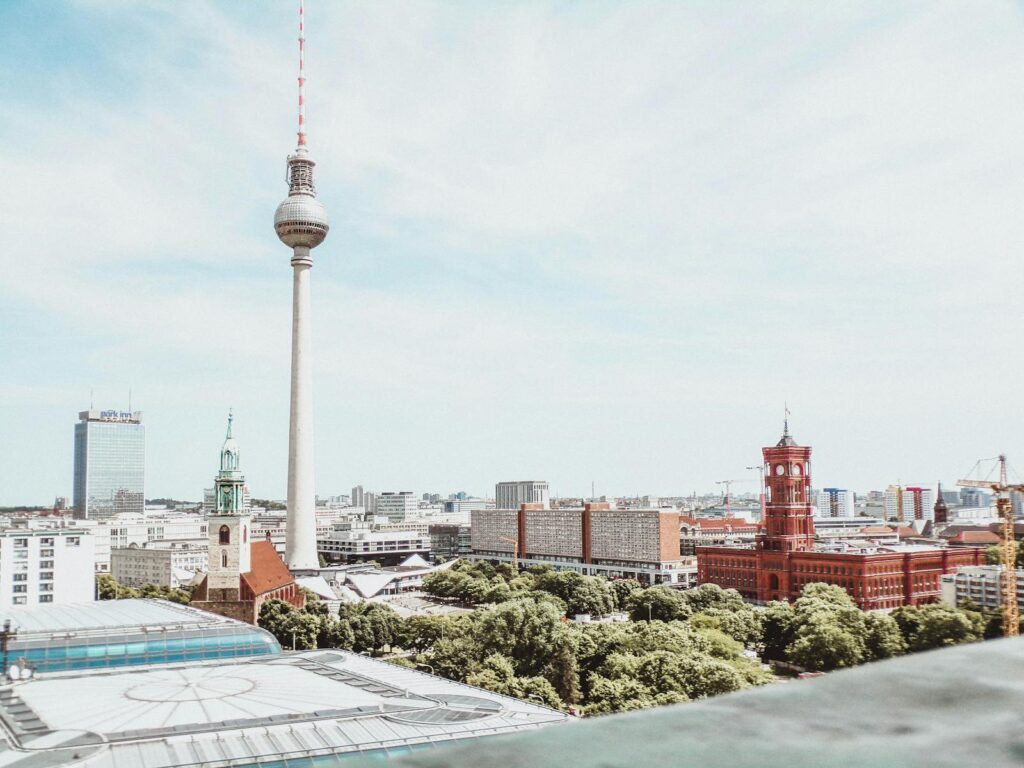 Picture this: a city where history and modernity dance together, where every street corner whispers tales of resilience and rebirth. Welcome to Berlin, a metropolis that effortlessly marries the charm of the old world with the vibrancy of contemporary life. If you’ve ever wondered what it’s like to live in a place that beats to its own unique rhythm, then Berlin is calling your name. From its renowned cultural scene to its inclusive, free-spirited atmosphere, this city offers an unparalleled quality of life that attracts dreamers, creators, and innovators from all corners of the globe.
Picture this: a city where history and modernity dance together, where every street corner whispers tales of resilience and rebirth. Welcome to Berlin, a metropolis that effortlessly marries the charm of the old world with the vibrancy of contemporary life. If you’ve ever wondered what it’s like to live in a place that beats to its own unique rhythm, then Berlin is calling your name. From its renowned cultural scene to its inclusive, free-spirited atmosphere, this city offers an unparalleled quality of life that attracts dreamers, creators, and innovators from all corners of the globe.
Berlin isn’t just any other European city; it’s a dynamic tapestry woven with diverse communities, avant-garde art, and endless opportunities. Imagine waking up to a panorama of eclectic architecture, cycling through lush green parks, or sipping coffee in a bohemian café that doubles as an art gallery. The city’s robust public transportation, affordable living costs, and progressive mindset make it a magnet for young professionals, families, and retirees alike. Whether you’re drawn by the pulsating nightlife, the rich historical landmarks, or the innovative tech scene, Berlin promises a lifestyle that thrives on diversity and inclusivity. In this blog post, we’ll delve into the myriad benefits of making Berlin your home, a decision that could very well redefine the way you experience life.
What are the benefits of living in Berlin? What makes it an attractive city to live in?
There are countless benefits to living in Berlin, making it one of the most attractive cities to reside in Europe. From its thriving cultural scene to its affordable cost of living, this city has something for everyone.
One of the biggest draws of Berlin is its rich history and vibrant culture. The city is a melting pot of art, music, and creativity, with numerous museums, galleries, and theaters scattered throughout its neighborhoods. Whether you’re a fan of classical art or contemporary installations, there’s always something new and exciting to explore. The annual Berlin International Film Festival also attracts cinephiles from around the world.
 Berlin is also known for its open-mindedness and inclusivity. The city has long been a haven for artists, musicians, and creatives seeking a place where they can freely express themselves. This atmosphere fosters a sense of community and encourages collaboration among individuals from different backgrounds.
Berlin is also known for its open-mindedness and inclusivity. The city has long been a haven for artists, musicians, and creatives seeking a place where they can freely express themselves. This atmosphere fosters a sense of community and encourages collaboration among individuals from different backgrounds.
Another benefit of living in Berlin is its excellent public transportation system. The city boasts an extensive network of buses, trams, trains, and subways that make getting around a breeze. With affordable monthly passes available, residents can easily navigate the city without relying on private vehicles.
In terms of cost of living, Berlin offers relatively affordable housing compared to other major European cities like London or Paris. Rent prices are reasonable, especially when considering the quality and size of apartments available. Additionally, daily expenses such as groceries and dining out are generally more affordable than in other cosmopolitan cities.
Berlin’s job market is also booming with opportunities across various industries. The city has become a hub for startups and tech companies, attracting young professionals looking to kickstart their careers. With numerous international companies establishing their presence in Berlin as well, there are ample job prospects for both locals and expats.
Lastly, Berlin’s location in the heart of Europe makes it an ideal base for travel enthusiasts. The city is well-connected to other European destinations, allowing residents to easily explore neighboring countries during weekends or holidays.
 Is Berlin the most incredible, most wonderful, greatest city in the German-speaking world?
Is Berlin the most incredible, most wonderful, greatest city in the German-speaking world?
While it’s subjective to determine whether Berlin is the “most incredible” or “greatest” city in the German-speaking world, there’s no denying that it holds a special place in many people’s hearts. Berlin’s unique blend of history, culture, and innovation sets it apart from other cities in Germany.
One of the factors that make Berlin stand out is its vibrant cultural scene. The city has a thriving arts community with numerous galleries, theaters, and music venues. From classical concerts at the Berlin Philharmonic to underground techno parties in abandoned warehouses, there’s always something happening for every taste.
Berlin also boasts a rich history that is visible throughout its streets. From iconic landmarks like the Brandenburg Gate and Checkpoint Charlie to remnants of the Berlin Wall, history buffs will find plenty to explore. The city has gone through significant transformations over the years and witnessing its resilience firsthand is truly awe-inspiring.
Furthermore, Berlin’s reputation as a hub for innovation and entrepreneurship adds to its allure. The city has become a hotspot for startups and tech companies due to its supportive ecosystem and access to talent. This entrepreneurial spirit fuels creativity and attracts individuals from all over the world who are looking to make their mark.
However, it’s important to note that each city in Germany has its own unique charm and appeal. Munich offers a more traditional Bavarian experience with its beer gardens and historic architecture while Hamburg boasts a bustling port and maritime culture. Ultimately, the “most incredible” city is subjective and depends on personal preferences and interests.
 What was life like in West Berlin? Why was it desirable to stay there instead of moving to West Germany?
What was life like in West Berlin? Why was it desirable to stay there instead of moving to West Germany?
Life in West Berlin during the Cold War era was unlike any other. The city, located deep within East Germany, was an island of democracy surrounded by the Soviet-controlled territory. Despite the challenges and hardships, many people chose to stay in West Berlin for various reasons.
One of the main factors that made West Berlin desirable was its unique status as a symbol of freedom. The city became a beacon of hope during a time when East Germany was under communist rule. Living in West Berlin meant living in a democratic society with access to Western ideals and freedoms.
Additionally, the Allied presence in West Berlin provided a sense of security for its residents. The United States, United Kingdom, France, and later on, Canada maintained military forces in the city as a show of support and protection against potential Soviet aggression.
Despite being physically isolated from West Germany by the Berlin Wall, life in West Berlin offered certain advantages. For example, residents enjoyed lower taxes compared to their counterparts in West Germany. This attracted businesses and entrepreneurs who took advantage of the tax benefits while contributing to the city’s economic growth.
Cultural life also thrived in West Berlin during this period. The city became a haven for artists, musicians, and intellectuals who sought refuge from political repression elsewhere. The avant-garde art scene flourished with galleries showcasing cutting-edge works that challenged societal norms.
 Furthermore, many individuals had personal reasons for staying in West Berlin. Families were divided by the construction of the wall, with some members finding themselves on opposite sides overnight. For these families, leaving their homes behind would have meant abandoning their loved ones.
Furthermore, many individuals had personal reasons for staying in West Berlin. Families were divided by the construction of the wall, with some members finding themselves on opposite sides overnight. For these families, leaving their homes behind would have meant abandoning their loved ones.
In summary, life in West Berlin was a unique experience that offered a sense of freedom, security, and cultural vibrancy. Despite the challenges posed by its isolation, many people chose to stay in the city due to its symbolic significance and the opportunities it provided.
Do many foreigners go to Berlin? Why or why not?
Berlin has long been a magnet for foreigners from all over the world. The city’s cosmopolitan atmosphere, diverse culture, and thriving job market make it an attractive destination for individuals seeking new experiences and opportunities.
One of the main reasons why many foreigners choose Berlin is its reputation as a hub for creativity and innovation. The city has a vibrant arts scene with numerous galleries, theaters, and music venues. Artists, musicians, and performers are drawn to Berlin’s open-mindedness and inclusive atmosphere that encourages artistic expression.
 Berlin’s job market is also a major draw for foreigners. The city has become a hotspot for startups and tech companies, offering ample employment opportunities in various industries. Additionally, Berlin’s international companies attract professionals from around the world who are looking to advance their careers in an innovative environment.
Berlin’s job market is also a major draw for foreigners. The city has become a hotspot for startups and tech companies, offering ample employment opportunities in various industries. Additionally, Berlin’s international companies attract professionals from around the world who are looking to advance their careers in an innovative environment.
The affordable cost of living compared to other European cities is another factor that attracts foreigners to Berlin. Rent prices are relatively reasonable, especially when considering the quality of apartments available. Daily expenses such as groceries and dining out are also more affordable compared to other cosmopolitan cities.
Furthermore, Berlin’s central location within Europe makes it an ideal base for travel enthusiasts. The city is well-connected by air and rail networks, allowing residents to easily explore neighboring countries during weekends or holidays.
However, it’s important to note that not everyone chooses Berlin as their destination. Some individuals may prefer other German cities like Munich or Hamburg due to personal preferences or job opportunities in specific industries. Additionally, language barriers can be a challenge for foreigners who do not speak German fluently, although English is widely spoken in many parts of Berlin.
Is Berlin too expensive to live compared to other German cities? Does the fact that it has a lot of jobs compensate the high cost of living? Would you choose Berlin, Frankfurt, or Hannover if you intended to move?
 Compared to other major German cities like Munich or Frankfurt, Berlin is generally considered more affordable in terms of cost of living. However, it’s important to note that affordability is relative and depends on individual circumstances and lifestyle choices.
Compared to other major German cities like Munich or Frankfurt, Berlin is generally considered more affordable in terms of cost of living. However, it’s important to note that affordability is relative and depends on individual circumstances and lifestyle choices.
Rent prices in Berlin are relatively reasonable compared to other cosmopolitan cities. The city offers a wide range of housing options at various price points, making it possible to find affordable accommodations. Additionally, daily expenses such as groceries and dining out are generally more affordable compared to other major cities.
While the cost of living may be lower in Berlin, it’s essential to consider the job market and income potential. The city has a thriving job market with opportunities across various industries. The presence of startups and tech companies has created a demand for skilled professionals. However, salaries may not be as high as in cities like Frankfurt or Munich where certain industries have a stronger presence.
When choosing between Berlin, Frankfurt, or Hannover for relocation, several factors come into play. If job prospects are the primary consideration and one is seeking opportunities in finance or banking sectors, Frankfurt may be the preferred choice due to its status as Germany’s financial hub.
Hannover offers a more relaxed pace of life compared to both Berlin and Frankfurt. It is known for its green spaces and quality of life. If work-life balance and proximity to nature are important factors for an individual intending to move, Hannover could be an attractive option.
Ultimately, the choice between Berlin, Frankfurt, or Hannover depends on individual preferences, career goals, and lifestyle priorities. Each city has its own unique advantages and disadvantages, and it’s important to carefully consider these factors before making a decision.
How is life in Berlin for foreigners?
Life in Berlin for foreigners is generally welcoming and inclusive. The city has a diverse population with residents from all over the world, creating a multicultural environment that embraces different cultures and backgrounds.
 One of the advantages of living in Berlin as a foreigner is the availability of resources and support networks. There are numerous organizations and initiatives dedicated to helping newcomers settle into the city. These organizations provide language courses, job assistance, and social integration programs to facilitate the transition into German society.
One of the advantages of living in Berlin as a foreigner is the availability of resources and support networks. There are numerous organizations and initiatives dedicated to helping newcomers settle into the city. These organizations provide language courses, job assistance, and social integration programs to facilitate the transition into German society.
Berlin’s international community also makes it easier for foreigners to connect with like-minded individuals. There are various expat groups, clubs, and events where people can meet others who share similar experiences or interests. This sense of community helps foster a feeling of belonging in a new city.
The city’s cosmopolitan atmosphere means that English is widely spoken in many parts of Berlin. While learning German is beneficial for daily life interactions, especially when dealing with administrative tasks or official matters, it’s possible to navigate daily life using English alone.
However, it’s important to note that cultural differences may still pose challenges for some foreigners adjusting to life in Berlin. Understanding local customs and norms can take time but immersing oneself in the local culture can help ease this transition.
Is Berlin a rich city?
 Berlin is not traditionally considered one of Europe’s wealthiest cities; however, its wealth lies beyond monetary value. The richness of Berlin comes from its cultural diversity, vibrant arts scene, and innovative spirit.
Berlin is not traditionally considered one of Europe’s wealthiest cities; however, its wealth lies beyond monetary value. The richness of Berlin comes from its cultural diversity, vibrant arts scene, and innovative spirit.
The city’s history and cultural heritage are invaluable assets. Berlin is home to numerous world-class museums, galleries, and theaters that showcase art, history, and performances from various eras. The preservation of historical landmarks such as the Brandenburg Gate and the Reichstag building adds to the city’s cultural richness.
Berlin’s reputation as a hub for creativity and innovation also contributes to its richness. The city has a thriving arts scene with countless artists, musicians, and performers calling it home. From street art in neighborhoods like Kreuzberg to avant-garde exhibitions in galleries, Berlin is a hotbed of artistic expression.
Furthermore, Berlin’s entrepreneurial spirit has led to the growth of startups and tech companies. The city attracts innovators from around the world who are looking to turn their ideas into reality. This culture of innovation fosters economic growth and creates opportunities for both locals and foreigners.
While Berlin may not be considered a wealthy city in terms of financial prosperity compared to cities like London or Zurich, its wealth lies in its cultural richness, diversity, and forward-thinking mindset.
Is Berlin more friendly than Munich?
 When it comes to comparing the friendliness of Berlin and Munich, it’s important to remember that perceptions can vary from person to person. Both cities have their own unique charm and characteristics that shape the overall atmosphere.
When it comes to comparing the friendliness of Berlin and Munich, it’s important to remember that perceptions can vary from person to person. Both cities have their own unique charm and characteristics that shape the overall atmosphere.
Berlin is known for its open-mindedness and inclusivity. The city has a reputation for embracing diversity and welcoming people from all walks of life. This inclusive atmosphere can make it easier for newcomers or foreigners to feel accepted in Berlin’s multicultural environment.
Munich, on the other hand, has a more traditional Bavarian charm. The city is known for its hospitality and warmth towards visitors. Bavarian culture places great importance on traditions and community, which can create a friendly and welcoming atmosphere.
It’s worth noting that the size and pace of each city can also influence perceptions of friendliness. Berlin is a larger metropolis with a bustling atmosphere, while Munich has a more compact city center with a slower pace of life. These factors can affect interactions between residents and visitors.
In the end, whether Berlin or Munich is considered more friendly largely depends on personal experiences and preferences. Both cities have their own unique qualities that make them attractive destinations to live in or visit.





